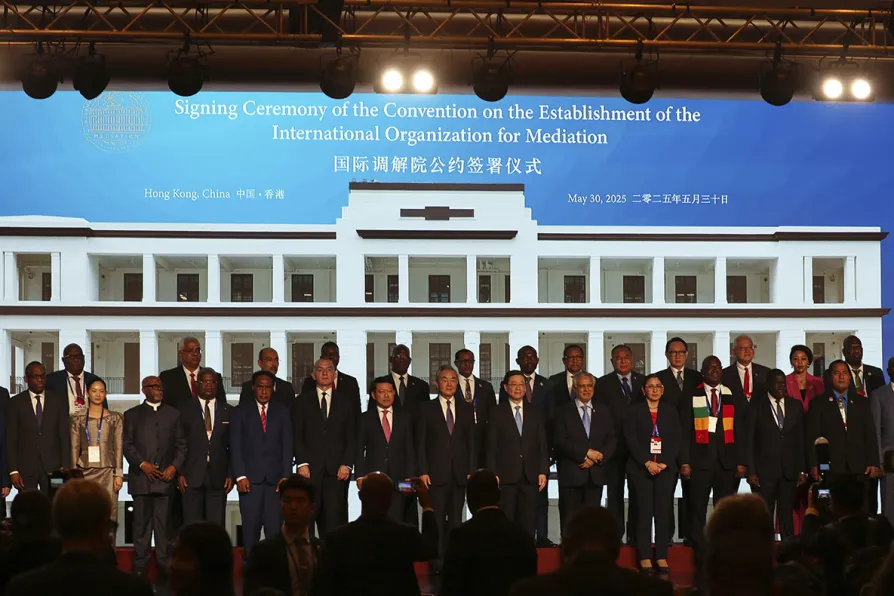
 Chinese Foreign Minister Wang Yi (centre) attends the signing ceremony of the ‘Convention on the Establishment of the International Organisation for Mediation,’ in Hong Kong, May 30, 2025
Chinese Foreign Minister Wang Yi (centre) attends the signing ceremony of the ‘Convention on the Establishment of the International Organisation for Mediation,’ in Hong Kong, May 30, 2025
CHINA was joined by dozens of countries today in establishing an international mediation-based dispute resolution group.
Representatives of more than 30 other countries, from Pakistan and Indonesia to Belarus and Cuba, signed the Convention on the Establishment of the International Organisation for Mediation in Hong Kong (IOMed) to become founding members of the global organisation, following Chinese Foreign Minister Wang Yi.
At a ceremony, Mr Wang said China had long advocated for handling differences with a spirit of mutual understanding and consensus-building through dialogue, while aiming to provide “Chinese wisdom” for resolving conflicts between nations.
“The establishment of the International Organisation for Mediation helps to move beyond the zero-sum mindset of ‘you lose and I win’,” he said.
He said the body, headquartered in Hong Kong, aims to help promote the amicable resolution of international disputes and build more harmonious global relations.
The organisation is the world’s first intergovernmental legal organisation for resolving disputes through mediation and for safeguarding the principles of the Charter of the United Nations.
It also positioned Hong Kong as an international legal and dispute resolution services centre in Asia.
Mr Wang said the city’s rule of law is highly developed, with the advantages of both common law and mainland Chinese law systems, asserting that it possesses uniquely favourable conditions for international mediation.
Hong Kong leader John Lee said the organisation could begin its work as early as the end of this year.
The ceremony was attended by representatives from some 50 other countries and about 20 organisations, including the United Nations.
Yueming Yan, a law professor at the Chinese University of Hong Kong, said the new organisation was a complementary mechanism to existing institutions such as the International Court of Justice and the Permanent Court of Arbitration in The Hague.
“While the ICJ [International Court of Justice] and PCA [Permanent Court of Arbitration] focus on adjudication and arbitration, IOMed introduces a structured, institutionalised form of alternative dispute resolution — namely, mediation — on a global scale,” she said.
Although many details about the new body are yet to be clarified, it could open the door for greater synergy between formal litigation or arbitration and more flexible methods like mediation, she said.
Shahla Ali, a law professor at the University of Hong Kong, said the organisation would have the capacity to mediate disputes between states, between a state and a national of another state, or in international commercial disputes.
Prof Ali added that the body “can provide opportunities to experiment with new approaches,” to mediation.

From anonymous surveys claiming Chinese students are spying on each other to a meltdown about the size of China’s London embassy, the evidence is everywhere that Britain is embracing full spectrum Sinophobia as the war clouds gather, writes CARLOS MARTINEZ

JENNY CLEGG reports from a Chinese peace conference bringing together defence ministers, US think tanks and global South leaders, where speakers warned that the erosion of multilateralism risks regional hotspots exploding into wider war











